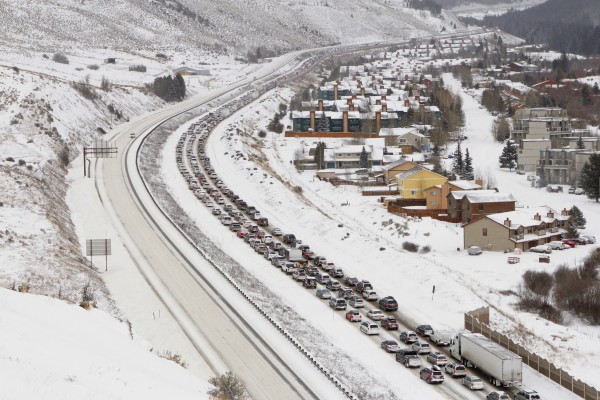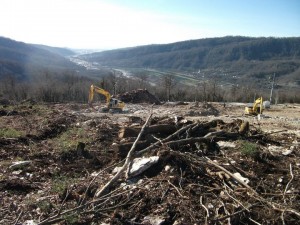Colorado green leaders question Olympic bid in wake of Sochi costs, impacts

Traffic snarled along Interstate 70 on the approach to the Eisenhower-Johnson Tunnel (Bill Linfield photo).
Former Colorado Gov. Dick Lamm, who spearheaded the rejection of the 1976 Denver Winter Olympics, says he’s not opposed to a future Colorado bid but advocates a rethinking of the games after the “wildly out of control” costs and environmental impacts of the $51 billion Sochi “extravaganza.”
“Now that we’ve got the most expensive Olympics in history, I just think there’s a lot of need in the world, and I can’t believe that you can’t have a cost-effective Olympics,” said Lamm, a three-term Democratic governor who now teaches public policy at the University of Denver.
As a state representative in 1972 Lamm formed a group called “Citizens for Colorado’s Future” that opposed the 1976 Denver Olympics – awarded by the International Olympic Committee (IOC) in 1970 — based on concerns about massive public debt, rampant growth and environmental devastation.
Colorado voters by a wide margin turned down state funding of the Olympics in November of 1972, forcing the IOC to relocate the games to Innsbruck, Austria, and marking the only time a city has ever given back the Olympics. Estimated costs for the Denver Olympics started at $14 million and had ballooned to $77 million by March of 1972.
“I was concerned that we had weak land-use laws, we had very limited ability as a state to say no to any developers, and it seemed to me it was a financial disaster waiting to happen and an environmental insult to Colorado,” Lamm said, adding he’s not taking a position on any future Colorado Olympic bid but that any proposal needs to be significantly scaled back from Sochi and make far more financial sense.
“I make no judgment on anything other than I feel the people voted back in 1972, and I think they voted wisely,” Lamm said. “The history of the Winter Olympics is a history of a flood of red ink, and you wonder whether or not there should be a rethinking.”
Colorado Gov. John Hickenlooper and Denver Mayor Michael Hancock formed an exploratory committee in 2011 to pursue a 2022 bid, but the United States Olympic Committee (USOC) in 2012 decided to bypass 2022 and either pursue a bid for the Summer Olympics in 2024 or the Winter Olympics in 2026. The estimated price tag for hosting the 2022 games was $1.5 billion.
USOC press officials did not respond to multiple requests for comment, but Bill Marolt, the president and CEO of the United States Ski and Snowboard Association and a USOC board member, said Colorado has a reasonable shot at hosting the games.
“Colorado clearly is a viable candidate with the mountains, the infrastructure, the organization,” Marolt said. “The USOC is looking at when is the most opportune time to make that bid, and we’ll just have to see what decision they make.”
Last week, at a pre-Sochi press conference, USOC CEO Scott Blackmun said the IOC had encouraged the USOC to submit either a 2024 summer bid or a 2026 winter bid. “We have a proud tradition on the summer side, and we’ve hosted the winter more recently than summer, so that’s going to be our initial focus,” Blackmun told reporters.
A USOC decision on a 2024 host city bid is due by the end of this year, with an IOC decision expected in 2017. The success or failure of a 2024 USOC summer bid would likely determine the fate of a 2026 USOC winter bid.
Asked about the criteria for a 2026 Colorado winter bid and the degree to which environmental impacts will be considered, IOC media relations manager Sandrine Tonge said, “The bidding process for the 2026 games has not started yet, so it would be premature for the IOC to comment on it.” Tonge referred additional questions about 2026 to the USOC.
Just bidding on 2022 would have cost an estimated $28 million to $45 million, which in part led Stockholm, Sweden, to pull out of that bidding process just last month, leaving Beijing, China; Oslo, Norway; Krakow, Poland; Almaty, Kazakhstan; and Lviv, Ukraine still in the running. The 2018 Winter Olympics will be held in Pyeongchang, South Korea – a venue that’s already been blasted by some winter sports enthusiasts.
The U.S. last hosted the Winter Olympics in Salt Lake City in 2002 at a cost of $2 billion and the Summer Olympics in Atlanta, Ga., in 1996 at a cost of $1.8 billion. Organizers from the Lake Tahoe area on the California-Nevada border and Salt Lake City, Utah — both regions that have previously hosted the games — pursued a possible 2022 bid before the USOC pulled the plug in 2012.
Marolt, a former Olympian who grew up in Aspen, says Colorado’s Olympic history of rejecting the games for financial and environmental reasons shouldn’t impact a future bid.
“There was a [Colorado] bid a number of years ago that was put together by a group that was led by [sports executive] Tim Leiweke and [broadcast executive] Roger Ogden, and that was a good exercise because we got back out into the national community, international community, made those connections, started to put an organization together to move past [1976], and hopefully that was done at that time,” Marolt said.
That Colorado bid was submitted in the 1990s for the games ultimately won by Salt Lake City, and the USOC reportedly rejected it on first ballot in part because the venues were too spread out across the state and in part because of Denver’s history of turning away the Olympics.
Untangling Olympic gridlock
The issue of distance between venues and improving the state’s mountain transportation system remains a critical one for Lamm and members of Colorado’s conservation community.
“We have a bottleneck in Interstate 70 going up to the mountains; it can’t be expanded,” said Lamm, noting the 1976 Olympics would have been held in Denver, Steamboat Springs and Beaver Creek, which hadn’t been built yet. “Just simply the Balkanized nature of the Olympics promised all kinds of logistical problems, but we are a much more sophisticated state at this time. It’s an expense problem, but I think we can engineer our way around that bottleneck.”
It’s 110 miles between 1976 alpine-skiing venue Beaver Creek and Denver on I-70 – a drive that took eight hours on a “normal” skier-traffic day during a snowstorm on Sunday, Feb. 9. It’s 160 miles between 1976 Nordic-skiing venue Steamboat and Denver, mostly on two-lane highways.
“Just as a part-time Colorado resident I would love to see them expand I-70, and the games might be the perfect reason for the state to be able to afford something like that,” said Jeremy Bloom, a two-time Olympic mogul skier and a member of the 2022 Denver Exploratory Committee. “There are some political challenges to navigate, as any bid city would have, but I think it would be amazing to have the Olympics in Colorado.”
Sarah Will, a 12-time Paralympic gold medalist in sit-skiing after she broke her back in a ski accident at Aspen Highlands in the late 1980s, says access to the mountains in general and for disabled athletes and spectators in particular are her two chief areas of concern for a 2026 bid.
“I look at what they did in Salt Lake, and just the fact that the road system got improved greatly to the mountains — and the same with Canada — and those things needed to happen [in Colorado],” said Will, who also served on the Denver Exploratory Committee.
Conservation Colorado Executive Director Pete Maysmith, who served on a subcommittee of the 2022 exploratory group after concerns were raised about a lack of environmental representation, said he doesn’t think there should be a 2026 Colorado bid if there’s no fix for I-70 included.
“If we’re going to make a serious bid for this, a condition of the bid should be that we fix the I-70 corridor,” Maysmith said. “And by fix I obviously don’t mean that we just lay a bunch more asphalt, but we come up with a comprehensive plan to move both residents and visitors from Denver and the metro area up to the mountains and back, and then we execute that plan.”
However, Maysmith said that point of view was not seriously considered on his subcommittee.
“I was met with two different reactions,” Maysmith said. “Kind pats on the head and ‘Oh, isn’t that a sweet idea.’ And, ‘Absolutely in a million years that’s never going to happen. You need to get over that.’”
Both federal and state officials, after decades of study, have concluded that simply widening I-70 through small mountain towns and sensitive alpine areas is not a viable long-term fix. The Colorado Department of Transportation (CDOT) is studying a rail alternative – or Advanced Guideway System – along the corridor in addition to some limited widening of the highway.
A previous CDOT-funded study in 2010 put the cost of dedicated, high-speed passenger rail from Denver International Airport to the Eagle County Regional Airport 40 miles west of Vail at $16 billion. Just DIA to Summit County, where the majority of Front Range day-skier traffic occurs, would cost $9 billion.
Russia reportedly spent nearly that much ($8.7 billion) – which is more than the total $6.4 billion spent on the 2010 Vancouver Winter Olympics – just for the 31-mile Adler-to-Krasnaya Polyana rail line linking the Black Sea to the mountain venues for the Sochi Games. However, there’s plenty of debate about what’s actually included in Sochi’s $51 billion price tag, which would make it the most expensive Olympics in history — summer or winter.
What isn’t debatable is that the costs of hosting the games continues to escalate dramatically, and that in the U.S. much of that burden falls on local and regional taxpayers. “I certainly hope it’d be less than $51 billion, because the federal government doesn’t get involved beyond security,” the USOC’s Blackmun said of future U.S. bids. “It’s a big, heavy burden on cities and states.”
Environmental legacy
In Sochi, ecologists critical of the development of public lands for Olympic venues have been arrested and jailed, and a Colorado-based environmental philanthropy foundation says a grant it provided a Russian group to monitor environmental destruction has been frozen in the group’s bank account.
The Boulder-based non-profit Global Greengrants recently reported that funds it provided to Environmental Watch on North Caucasus have been frozen by Russian authorities after the Russian-based conservation group criticized the games as the most environmentally destructive in history. The groups blasted the organizing committee and the IOC for allowing ski jumps, courses and other infrastructure to be built on 6,000 acres of Sochi National Park.
“One of the reasons why these games cost so much is that they have been built on national park land, requiring new roads and infrastructure to be built, entire forests and rivers to be destroyed,” Global Greengrants Executive Director Terry Odendahl said in a press release. “Why would the International Olympic Committee choose to hold the games there? With climate change accelerating, we need to be protecting our forests, not clear-cutting them.”
The IOC’s Tonge, however, counters that for Russia the games mark serious environmental progress.
“The Sochi 2014 Games are believed to be the first global sports event in Russia to have taken environmental concerns and the principles of sustainability into consideration,” Tonge said. “In regard to land compensation, 20,000 hectares [or nearly 50,000 acres] of land will be added to [Sochi] National Park to compensate for land used during the construction of games venues.”
One of the factors that worked against the original bid for the 1976 Denver Olympics was the passage in 1969 of the National Environmental Policy Act creating more stringent environmental protections and making it far more difficult to build Olympic infrastructure on public lands.
Tonge did not address questions about the arrest and long-term jailing of Russian ecologists or the criticism by athletes of the IOC’s selection of warmer coastal regions such as Vancouver and Sochi, where more snowmaking is often required, or snow has to be stored or transported at great expense. However, she did point out other signs of progress in Russia as a result of the games.
“Green building standards have been created for the first time in Russia, and these are expected to be in use nationwide following the games,” Tonge said. “For the first time in the history of the Olympic Games, Sochi 2014 will voluntarily mitigate not only its own carbon footprint, but also that of the flights of athletes, spectators and media representatives.”
The mitigation of greenhouse gases, according to Tonge, is being “enabled” by the official chemistry company of the games, Dow Chemical. Despite these measures, criticism of both the Sochi Games and the IOC for choosing Russia remains persistent on many fronts.
“I think the environmental impact of the Sochi Games is more a function of Russia being a kleptocratic autocracy than any inherent issue with the Olympics,” said Auden Schendler, vice president of sustainability for the Aspen Skiing Company, adding the continued selection of coastal regions for the Winter Games is “clueless, really. Sochi and Vancouver [Cypress Mountain] are hardly signs of climate change; they always have bad snow.”
Colorado ski companies such as Aspen and Vail, both of which have gone to great lengths to mitigate greenhouse gases and offset their enormous carbon footprints, should be seen as examples for the IOC in its selection process for future games, Maysmith says.
“It’s incredibly disappointing to know that valuable wetlands or national preserve areas are being plowed over, paved under for the sake of a two-week event,” Maysmith said. “The IOC would do well to model themselves after some of the ski resorts and companies here in Colorado as they start to look forward on issues like water and renewable energy and climate change itself.”


Latest posts by David O. Williams (see all)
- During National Small Business Month, Target, DreamSpring put funding bullseye on underrepresented communities in Denver area - May 29, 2025
- Colorado senator urges Supreme Court to hold Trump administration in contempt on deportations - April 19, 2025
- Conductor who brought back Colorado ski train wants to use rail to save state’s highways for skiing - March 20, 2025





You must be logged in to post a comment Login